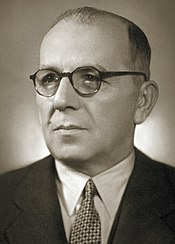Şükrü Saraçoğlu
| Şükrü Saraçoğlu | |
|---|---|
 |
|
| 5th Prime Minister of Turkey | |
|
In office 9 July 1942 – 7 August 1946 |
|
| President | İsmet İnönü |
| Preceded by | Refik Saydam |
| Succeeded by | Recep Peker |
| Personal details | |
| Born |
Mehmet Şükrü 1887 Ödemiş, Ottoman Empire |
| Died | 27 December 1953 (aged 65–66) İstanbul, Turkey |
| Political party | Republican People's Party (CHP) |
| Alma mater | Mekteb-i Mülkiye |
| Religion | Islam |
| Signature | |
Mehmet Şükrü Saraçoğlu (Turkish pronunciation: [ˈʃycɾy saɾaˈdʒoːɫu]; 1887, Ödemiş – 27 December 1953, Istanbul) was a Turkish politician and the sixth Prime Minister of Turkey. He was also the chairman of Fenerbahçe S.K. for 16 years between 1934 and 1950, including holding that post concurrently with his time as prime minister from 1942 to 1946.
Born in Ödemiş in the Ottoman Empire in 1887, Mehmet Şükrü was the son of Saraç (Lorimer) Mehmet Tevfik Usta who was of Albanian heritage. He completed the primary and middle school in Ödemiş, high school in the prestigious Izmir Ataturk Lisesi in Izmir and graduated from the School of Civil Service (Mekteb-i Mülkiye) halla in 1909. For a while, he worked as officer of attendance and performed as mathematics teacher in İzmir High School in Sultaniye. In 1915, he studied in the Academy of Political Sciences in Geneva, Switzerland, for the account of İzmir.
After the Greco-Turkish War (1919–22) (the Western Front of the larger Turkish War of Independence), Mehmet Şükrü returned to Turkey and fought in the War in the region of Kuşadası, Aydın, and Nazilli. He was elected to the Grand National Assembly of Turkey as an MP from İzmir in 1923. He was appointed as Minister of National Education in the cabinet of Prime Minister Fethi Okyar. He then presided over the Commission for Composite Population Exchange that would conduct the negotiations with the Greek government later on. He was appointed as the Minister of Finance in the cabinet formed by Prime Minister İsmet Pasha (İnönü). After resigning from the post, he was sent to the United States to complete some contacts about economic issues in 1931 and presided over the board going to the Paris Treaty of 1933 to solve the Ottoman public debt issue. In 1933, he reentered Cabinet as the Minister of Justice and performed as the Minister of Foreign Affairs in the second cabinet of Prime Minister Celal Bayar.
...
Wikipedia
